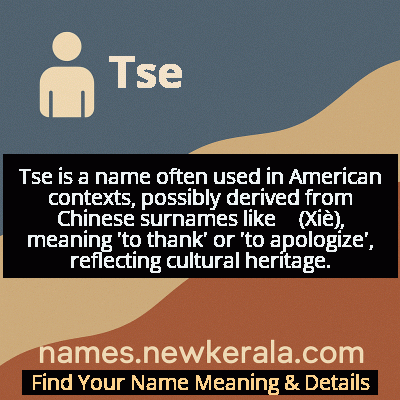Tse Name Meaning & Details
Origin, Popularity, Numerology Analysis & Name Meaning of Tse
Discover the origin, meaning, and cultural significance of the name TSE. Delve into its historical roots and explore the lasting impact it has had on communities and traditions.
Name
Tse
Gender
Male
Origin
American
Lucky Number
8
Meaning of the Name - Tse
Tse is a name often used in American contexts, possibly derived from Chinese surnames like 謝 (Xiè), meaning 'to thank' or 'to apologize', reflecting cultural heritage.
Tse - Complete Numerology Analysis
Your Numerology Number
Based on Pythagorean Numerology System
Ruling Planet
Saturn
Positive Nature
Ambitious, efficient, realistic, and authoritative.
Negative Traits
Materialistic, stressed, confrontational, and can be overly ambitious.
Lucky Colours
Dark blue, black.
Lucky Days
Saturday.
Lucky Stones
Blue sapphire, amethyst.
Harmony Numbers
2, 4, 6.
Best Suited Professions
Business leaders, managers, financial services, law enforcement.
What People Like About You
Leadership, determination, organizational skills.
Famous People Named Tse
Tse Tsan-Tai
Revolutionary and writer
Chinese revolutionary who co-founded the South China Morning Post and advocated for democratic reforms
Tse Kian Choo
Academic researcher
Malaysian educational technology researcher known for contributions to multimedia learning and instructional design
Tse Chi Lop
Alleged criminal
Reported to be a major figure in Asian drug trafficking networks, sometimes called 'Asia's El Chapo'
Name Variations & International Equivalents
Click on blue names to explore their detailed meanings. Gray names with will be available soon.
Cultural & Historical Significance
Historically, rock formations like Spider Rock in Canyon de Chelly and Shiprock in New Mexico have served as sacred sites and navigation points for the Navajo people. The name Tse connects an individual to this geographical and spiritual heritage. In Navajo creation stories, rock people and stone beings play crucial roles, further emphasizing the sacred nature of geological formations. The name also reflects the practical importance of rocks in traditional Navajo life - used for tools, building materials, and ceremonial purposes. This dual significance, both spiritual and practical, makes Tse a name that carries weight and responsibility within Navajo society.
Extended Personality Analysis
Individuals named Tse are often perceived as possessing rock-like qualities - steadfast, reliable, and emotionally resilient. They tend to be the anchors in their social circles, providing stability during turbulent times. Their practical nature and methodical approach to problem-solving make them excellent in crisis situations where calm deliberation is needed. While they may appear reserved initially, those named Tse typically develop deep, lasting relationships built on trust and loyalty. Their strength often manifests as quiet determination rather than overt aggression, much like erosion slowly shapes stone over centuries.
This foundational personality often extends to a strong sense of responsibility and protective instincts toward family and community. People named Tse frequently become the pillars of their social groups, offering unwavering support and practical wisdom. Their consistency makes them excellent in roles requiring long-term commitment and reliability. However, like the geological formations they're named for, they may sometimes be perceived as inflexible or slow to change. Their greatest strength lies in their ability to weather storms and provide shelter to others, embodying the ancient wisdom that true strength lies not in aggression but in enduring presence and reliability. This makes them particularly valued in leadership positions where steady guidance is essential.
Modern Usage & Popularity
In contemporary usage, Tse remains primarily a Navajo name but has seen increased visibility as cultural appreciation for Indigenous names grows. The name maintains strong cultural ties within Navajo communities while occasionally being adopted by non-Native parents seeking meaningful, nature-inspired names. Its simplicity and powerful symbolism make it appealing in an era where unique yet significant names are valued. While not appearing on mainstream baby name charts, Tse represents a growing trend of reclaiming and preserving Indigenous naming traditions. The name's usage reflects broader movements toward cultural preservation and identity affirmation among Native American communities. Urban Navajo families often choose the name to maintain cultural connections while living outside traditional lands. The name has also gained some recognition through increased representation of Indigenous cultures in media and education, though it remains relatively uncommon outside Navajo communities.
Symbolic & Spiritual Meanings
Symbolically, Tse represents far more than its literal meaning of 'rock.' It embodies the concepts of foundation, permanence, and spiritual grounding. In many Indigenous worldviews, rocks are considered the bones of Mother Earth, making Tse a name that connects the bearer to the fundamental structure of the world. The symbolism extends to protection and boundaries, as rocks naturally form defensive structures and mark territories. Metaphorically, Tse suggests someone who provides shelter and safety to others, much like rock overhangs protect from storms. The name also carries connotations of wisdom and memory, as geological formations hold the history of the land within them. In a modern context, Tse symbolizes environmental consciousness and connection to ancestral lands, representing both personal strength and cultural continuity across generations. The name serves as a reminder that true strength often lies in resilience and adaptability, qualities that have allowed Indigenous cultures to endure through centuries of challenge and change.

